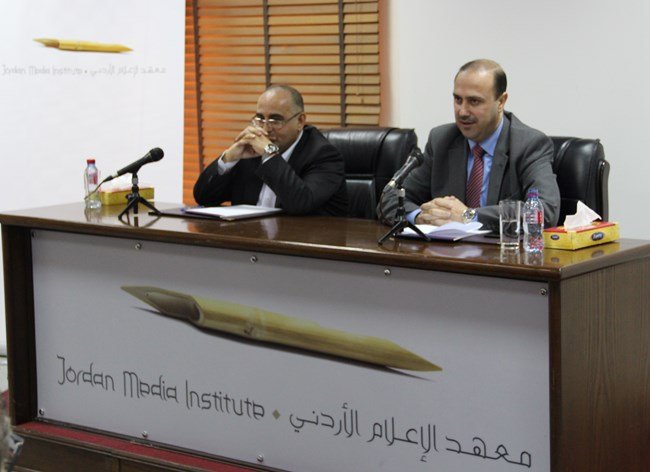Image:

22 Mar 2018
22 Mar. 2018 <br />
<br />
Amman- Dr. Mohammad Al-Momani, minister of state for media affairs, said that 80% of negative comments in some crises come from outside the Kingdom, with the aim of instigating public opinion and exporting chaos. He said that the government deals with these external messages wisely, noting that there are false stories that are published in some external newspapers. We know their objectives, sources, and the parties that stand behind them, he said.<br />
<br />
In a lecture at the Jordan Media Institute (JMI) titled "Role of Media in Shaping Public Opinion Vis-à-vis Public Policies," Al-Momani added that the state, as well as opinion leaders, should get credit for strengthening the national media scene. He said: Our national media is strong and capable of criticizing governments and their policies. Our media has a high level of awareness and patriotism. The awareness of the media community is now better than what it was five years ago. The margin of freedom in Jordan is advanced and is one of the elements of strength of the state and its national security, he said.<br />
<br />
He pointed out that media security is important for strengthening the home front. This places a big burden on the government. He noted that in spite of the economic conditions in the Kingdom and the drop in government spending on the media sector, investment in human resources is our true wealth in the media. This does not mean that the media should become the job of those who are unable to find another job.<br />
<br />
Al-Momani said: In light of some internal crises and the difficult circumstances in the region, we always seek to cooperate with internal and external media and to make accurate statements about any issue, using political language that takes into consideration the higher interests of the state and balance. We also repeat our positions so as to leave no room for doubt. This requires great efforts.<br />
<br />
Al-Momani said that there are three levels of interaction with the media. The first is the professional political level, which is through responding to the media and providing information continuously. This is done through public opinion leaders. Our attitude toward journalists is based on the quality that they produce and the credibility and professionalism that they demonstrate.<br />
<br />
Al-Momani said that the second level of interaction with the media is legal. He noted that some people think that media laws have shortcomings, but they are very advanced and have room for criticism and contributing to the shaping of public opinion. There is no legal obstacle to the exercise of professional media freedom. Criticism is required, but without insult or personalization. Everybody is under the umbrella of the law, and this applies to journalists and officials.<br />
<br />
He said: Laws are meant to protect society, such as preventing hate speech and sectarianism. Anyone who promotes this will be held legally accountable in order to preserve civil peace. The media must maintain the values of society. Of course, this is not against freedom of expression, he said.<br />
<br />
Al-Momani added that the third level of interaction is security. It is based on continuous training on handling news that affects national security. Journalists must be aware of the seriousness of what they publish when it comes to national security and the security of the community.<br />
<br />
On social media and the free flow of information, Al-Momani said that these outlets should be used constructively rather than destructively. The solution is not to close them down, but to have awareness in society and use social media for the good of society, and not as an instrument of hatred.<br />
<br />
During the discussion with JMI students and other attendees after the lecture, Minister Al-Momani said that the delay in issuing government statements during crises was because accuracy comes before speed. However, he noted that there is constant development in indirect ways to clarify situations to the public, such as issuing information by an informed source. If there is no accurate information, the competent agency can release a story directly.<br />
<br />
He also noted that each crisis is governed by certain security and political considerations. On the licensing of Yarmouk TV, he said that the file is not political and that the station was broadcasting illegally. The case has been referred to the judiciary, but we did not close the channel. We are a state of law, and there is nothing that prevents licensing it if it meets the necessary conditions, he said.<br />
<br />
Al-Momani underlined the need for activating the role of press spokespeople at any department or ministry. A successful politician must always be beside his media adviser.<br />
<br />
The discussion also revolved around the Access to Information Law. Al-Momani said that the challenge is that some journalists are unaware of the law. There are questions that are impossible to answer. They could include confidential military information. However, around 95% of the questions are answered.<br />
<br />
On the continuing crisis of confidence with the government, Al-Momani said that this exists in all countries. Not being satisfied with government actions does not mean applauding crime, as happened recently in robberies. He said that populism is a very dangerous phenomenon. Officials must make decisions that serve the interests of the state.<br />
<br />
The lecture, moderated by JMI Dean Dr. Basim Tweissi, is within the "guest lecturer" program, in which the JMI hosts officials, opinion leaders, and journalists to offer their practical experiences to MA students at the JMI.



